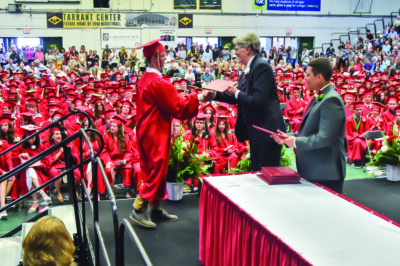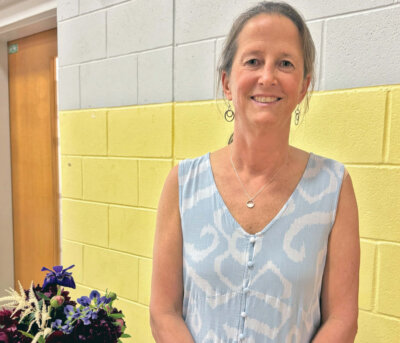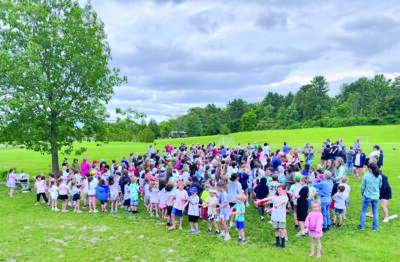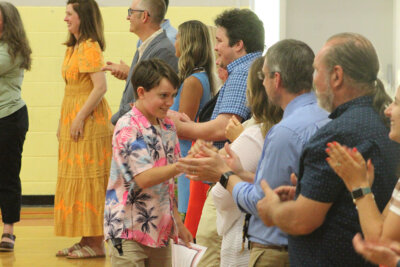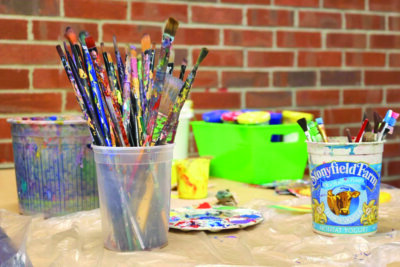“I have felt very fulfilled by this career,” CCS art teacher retires
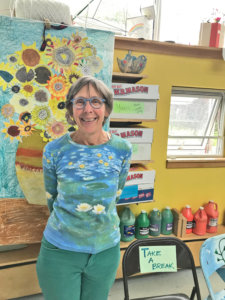
Periwinkle-blue glasses frame eyes that are only a shade lighter than they are. These eyes belong to Alice Trageser, retiring art teacher at Charlotte Central School.
Trageser’s glasses, periwinkle-blue frames with striped temples, are a lot like the teacher herself: fun, colorful and doing their job brilliantly.
Certified to teach art in 1981, she has taught at CCS for six years, been named Vermont’s 2013 art educator of the year, and run a summer camp for artistically inclined youths out of her own barn.
During her 40 years in Vermont, Trageser has taught in Vergennes, Hinesburg and Charlotte. Her summer camp also ran for eight years. Her six years in Charlotte, she says, “have felt much longer. I’m always being enriched by [the students’] art.”
Walking through the halls of CCS, this is easy to see. Nearly every flat surface has at least one piece of student art carefully hung on it, and the longer the hallway, the more art Trageser has put up.
Vicki Nelson, a school counselor at CCS, says that Trageser “makes the school a welcoming place for art.”
Directly inside the doors, the walls are currently home to paintings of birch trees. Trageser excitedly points to them and explains that the students used tongue depressors dipped in paint and then moved sideways to achieve the mottled look of birch bark. Her face lights up when she talks about her projects, especially the less conventional ones.
For Trageser, art is a way for students to integrate learning and open their minds across all spectrums of study. One of her favorite projects focused on sustainability by urging students to bring in plastic bottle tops, which they would have otherwise thrown away, and make a mural out of them.
“Alice understands that students benefit when their learning is choice-based, integrated and authentic,” said Heidi Huestis, library media specialist at CCS.
Indeed, Trageser is excited for the future of art education and integration into other fields. “There’s been a lot of talk about the STEM subjects—science, technology, engineering and math—becoming STEAM, using art to help teach.” Even with art programs being cut around the country, Trageser is “hopeful” for the future of art education and intends to remain as involved as she can.
Her retirement from the public school system does not mark a retirement from either art or teaching, she says. She’s hoping to use her free time to travel and broaden her own artistic horizons while focusing some on her own work. Trageser’s personal art form often takes the shape of sculpture, using things from nature, but she says she’s open to dabbling more in painting and drawing.
In teaching, Trageser loves the units where she gets to educate on cultural and professional art, not just on different art projects. She always tries to find an art museum on any trip she takes and would love to travel to exotic locations to see new styles of art.
“All of the arts,” says Trageser, “can let you put aside your problems of the moment and let you get absorbed and find inner creativity. And that’s what we hope, that’s what you build an art program to do.”
“She loves to connect about art,” says Nelson, “and cultivate a love of art.”
This love of art extends beyond just her job of teaching children and into her interaction with colleagues as well. In talking to her colleagues, words like kind, caring, authentic and inspiring are the most often used.
As for the kids, Trageser says she has felt “very fulfilled by this career.” Kids, she says, “are ready to go, with very few inhibitions about their art.”
She says her teaching philosophy about art is simple: “experiment, take risks, creativity will come.”
Summer intern Sarah Wolverton was born and raised in Jackson Hole, Wyoming, and moved to Charlotte two years ago. She is a rising senior at Syracuse University with a double major in magazine journalism and marketing management. She enjoys writing, reading and telling each of her three dogs that they’re her favorite.
Related Stories
Popular Stories
If you enjoy The Charlotte News, please consider making a donation. Your gift will help us produce more stories like this. The majority of our budget comes from charitable contributions. Your gift helps sustain The Charlotte News, keeping it a free service for everyone in town. Thank you.
Andrew Zehner, Board Chair



